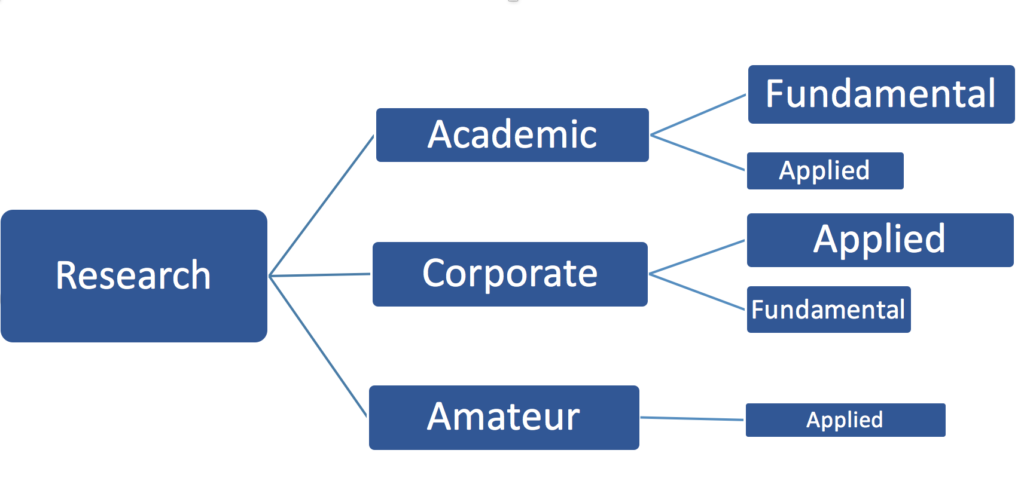Dr. Najeeb Kuzhiyil
Staff Scientist at Exxon Mobil Corporation, USA
What is Research?
Research is the process by which new knowledge, process, and products are created. Most of the products we use today in your day-to-day life, from toothpaste to soap and buses to airplanes, were part of somebody’s research someday. Research brings about discovery, invention, and innovation that eventually improve quality of life. Discovery is finding a fact or entity for the first time that already existed while the invention is building a product or process that never existed. Isaac Newton discovered the laws of gravity which was already in the universe while Michael Faraday invented a dynamo. When a product or process is improved upon an existing one using novel ideas, it is called innovation. Numerous engineers innovated to transform the tarp-and-wood, skeleton-like airplane of the Wright Brothers into a Boeing 737.
Research is done in several areas of science (including social sciences) and technology by universities, companies, and amateurs. Universities do mostly basic science or fundamental research to advance science by creating new knowledge. They also work with industry to create products and processes using the current knowledge which is called applied research. Companies or corporates do their research which is discussed below in detail. Many people with no affiliations carry out their research in the field of their interest which can be called amateur research.
Corporate Research
Companies sell products and services for a profit. For them to be competitive in the market, they need to constantly invent and innovate for which research is essential. Most companies have their research and development (R&D) groups while some outsource their research by paying for research or licensing others’ technology. It is worth noting that companies always call their research R&D because the development of products, processes, and services is their main goal.
Corporate research can be generally categorized into three:
- Basic or Fundamental research: In some of the industries, a fundamental understanding of materials, energy sources, and processes is key to building their products and services. The research to obtain fundamental understanding and to generate new knowledge is called fundamental research. For example, when John Dalton discovered atoms, this was a fundamental understanding of elements. Though fundamental understanding is essential, such knowledge need not necessarily transform into products or processes that a company can monetize. In 1884, when Carl Braun discovered semiconductor, no one knew it would be of any use to the world. Today I am typing this on a computer and you are reading this on an electronic device which would be impossible without a semiconductor. As fundamental research is expensive and not assuring of monetary benefits, most of the companies today outsource it to universities and smaller research firms.
Most of the fundamental research is done by Ph.D.’s, of course with the help of other professionals.
- Applied research: This is the bread and butter of most companies as they develop their products and services by applying the current scientific knowledge. In applied research, it is mostly innovation, although serendipity hits at times, and there comes a discovery or invention. The research team of Apple creates new iPhones using existing knowledge and technology while Tesla builds cars the same way.
Applied research is based on projects that have very clear deliverables and strict timelines that are usually short (if you are developing an iPhone, this could be 2 years while a car would take 5 years). The end goal is always a product or process.
Although applied research follows fundamental research most of the time, it is not always linear. It could lead to some discoveries that can lead to going back to fundamental research in a circular fashion.
Companies hire Ph.D.’s, engineers, and undergraduate degree holders into applied research. A significant number of technicians are involved as well. In many companies, the applied research division is called Technology Division/Department.
- Strategic research: Companies have their core competencies and proprietary products. Strategic research is focused on enhancing core competencies and long-term product and process developments. Therefore, it consists of elements of both fundamental and applied research. If you are making cars, the strategic research group would be looking into all kinds of potential technologies that can be used in a car for the next 10 to 50 years. They would be modeling potential scenarios of car use in the future and the possible changes to consumer behaviors. In such kind of research, you only have a general direction and it is never easy to predict where exactly you wind up.

Strategic research is mostly led by experienced researchers with excellent knowledge of the business line as well as relevant technologies.
Additional Features of Corporate Research
Publishing: In corporate research, protecting intellectual property is extremely important and valuable to the company. Therefore, companies do not allow employees to publish research papers as freely as universities. Instead, they are encouraged to file patents. Some of the very secretive technologies are not even patented and are kept as “trade secret”.
Workforce: Though most of the jobs in research require a Ph.D. in a relevant field, in corporate R&D, many with an undergraduate or master’s degree are employed. Also, many Ph.D.’s do not work in the same area of their dissertation work. Companies value the ability to conduct independent research in areas of interest and the transferrable skills researchers possess.
Research career: Research, both in academia and corporate, is a rewarding career. However, obtaining a Ph.D. is laborious and time-consuming, and it need not bring any financial advantage over an undergraduate degree. Hence, to pursue a Ph.D., one must be passionate about research and enjoy a good deal of patient and persistent work in highly specialized areas.
Well, if you chose one, wish you good luck with your research career, and if you are considering one, welcome to the club!

